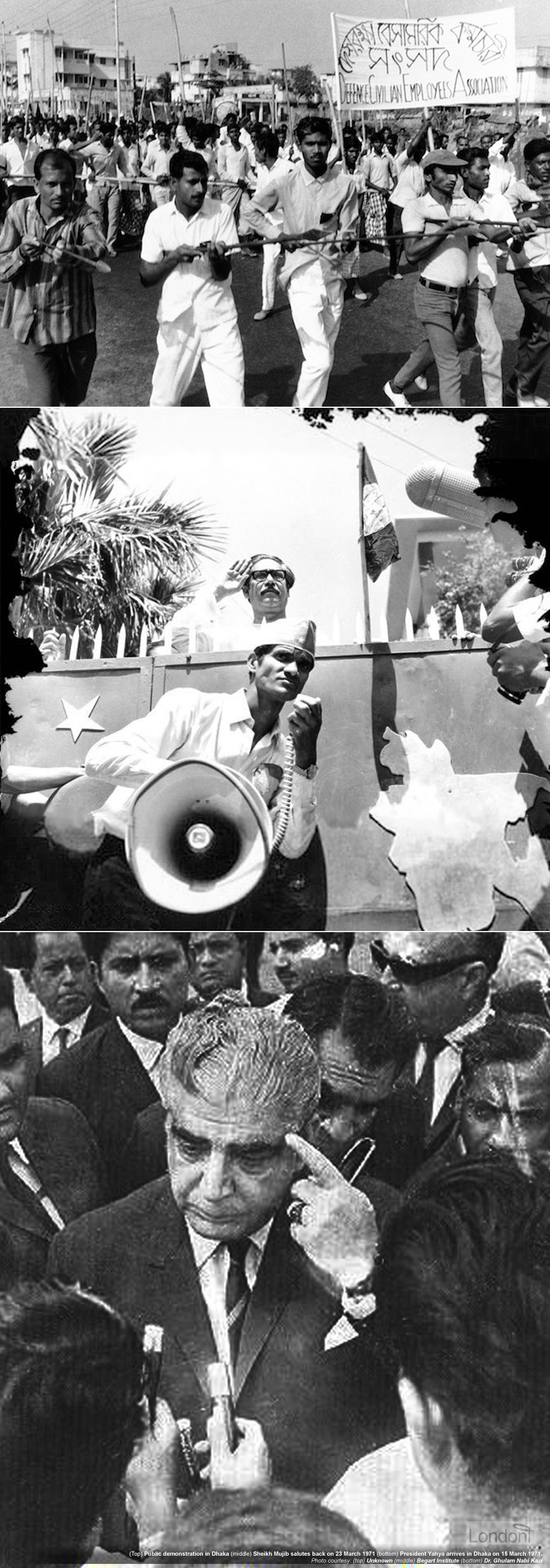
Last 10 days of East Pakistan
Last updated: 5 October 2017 From the section 1971 Muktijuddho
15 March: President Yahya arrives in Dhaka
In a bid to curb the growing unrest and halt the civil disobedience movement, President Yahya Khan arrived along with several other generals at Dhaka on 15 March 1971 at 2:20 pm. Accompanying him were Principal Staff Officer Lt. General S. G. M. Peerzada, General Hamid, Major General Roedad Khan, Major General Golam Umar, Legal Adviser Justice A. R. Cornelius, Deputy-Chairman of Planning Commission M. M. Ahmad, former Finance Minister of Pakistan N. M. Uqaili, and Colonel Hasan. They were escorted by a company of heavily armed Punjabi troops. They made their way from an eerily quiet airport to the confines of the President’s Bhaban (House) to meet Sheikh Mujib for "negotiations".
This final bid to maintain Pakistan's integrity has been likened to 'giving oxygen to a dying patient when the doctors have declared him a lost case'. The level of mistrust between Yahya and Mujib was so great that their first meeting had to take place in the bathroom off the main bedroom – as the Awami League leader would not hold discussions in the Presidential House's drawing-room in case it was bugged.
Ian Talbot, author of "Pakistan: A Modern History" (1998)
16 March: President Yahya and Sheikh Mujib for the first time in three months
On 16 March 1971 President Yahya met Sheikh Mujibur Rahman. This was the first time both men met since late December (1970) when President Yahya came to Dhaka. In an hour long discussion President Yahya explained his reasoning for cancelling the National Assembly session on 1 March 1971 whilst Sheikh Mujib remained defiant on his demands and did not wield to any pressure by the President. Negotiations between the two men dragged on, but from cryptic press communiques and radio quotes they appeared to be leading nowhere. Elsewhere, the non-cooperation movement was continuing.
Yahya said if martial law were withdrawn at that point [i.e. beginning of March 1971], there would be a constitutional vacuum in the country, to which Mujib replied that he would ask his advisers to get in touch with the president's advisers with a view to the two sides working out a formula that would do away with the chances of a vacuum.
Following Bangabandhu's instructions, Dr Kamal met the president's principal staff officer Lt. Gen. S. G. M. M. Peerzada and informed him in no uncertain terms that the manner in which the national assembly session had been postponed was uncalled for.
The Daily Star (Bangladesh)
17 March: Yahya-Mujib secret talks & Maulana Bhashani calls upon people to celebrate National Day of Pakistan as "Swadhin Purba Bangla Dibosh"
On 17 March Yahya-Mujib discussion was again held. But neither the government nor the Awami League disclosed any detail. For their part the government formed a 5-member enquiry committee consisting of a Justice nominated by the Chief Justice of High Court, an army officer of the rank of a brigadier, a CSP officer, one police officer and an officer of the EPR of the rank of a colonel, to find out why the army were called into action and the reasons behind the killing of the people during the hartal.
18 March: Awami League rejects government's 5-member enquiry committee and form an alternative 3-member committee
On 18 March 1971 Awami League rejected the 5-member enquiry committee formed by the government to submit report to the army authority. Instead they formed a separate 3-member enquiry committee consisting of Captain Mansur Ali, Khondaker Moshtaque Ahmed and Abidur Reza. Meanwhile Syed Nazrul Islam protested against firing at Tejgaon, Dhaka, and cautioned the government that the Bengali people would no longer tolerate such provocation.
On this day there was no discussion between President Yahya and Sheikh Mujib.
19 March: Both parties agree to meet tomorrow & Pakistan Army attacks common people in various places
On 19 March 1971 another Yahya-Mujib meeting took place and it was decided there would be another meeting the following day. Representatives from both sides had a separate meeting to formulate the basis of discussion for the impending meeting.
As the discussion was taking place Pakistani army fired on common people in Rangpur and Syedpur. But in Joydebpur the Bengali officers and troops of the 2nd East Bengal Regiment protested against disarmament leading to the first mutiny of Bengali forces.
20 March: President Yahya and Sheikh Mujib meet again - but this time with their advisors
Failing to negotiate, President Yahya and Sheikh Mujib met again on 20 March 1971 and talked for 2 hours. This time their advisors were present. Accompany Sheikh Mujib was six of his party leaders: Syed Nazrul Islam, Tajuddin Ahmad, Kamal Hossain, Khondaker Moshtaque Ahmed, A. H. M. Qamaruzzaman and M. Mansur Ali – all of whom, except Kamal Hossain, would later form the Mujibnagar Shorkar (Government). Accompany President Yahya were Justice A. R. Cornelius, Lt. General Peerzada and Colonel Hasan.
All the men had two discussion meetings that day with Sheikh Mujib declaring the dialogues as progressive. Yahya Khan's dilemma was that the longer he delayed a political solution the more fertile ground he provided for a Bengali guerrilla warfare.
Yahya Khan could be called a "political novice" and an "unpredictable drunkard", but he had a good professional reputation. It could be safely assumed that he would not commit his fighting machine to battle unless there was a reasonable chance of success. And more so when his survival as a military dictator depended solely on the outcome of a war which might start or which might be imposed on him.
Sukhwant Singh, author of "India's Wars Since Independence" (2009)
Another meeting was scheduled for the next day with the President and his advisors. Later that day Sheikh Mujib had a meeting with Mumtaz Daulatana, Mufti Mahmud and others.
Meanwhile, the government instructed the civilians to surrender their licenced arms to the appropriate police stations.
